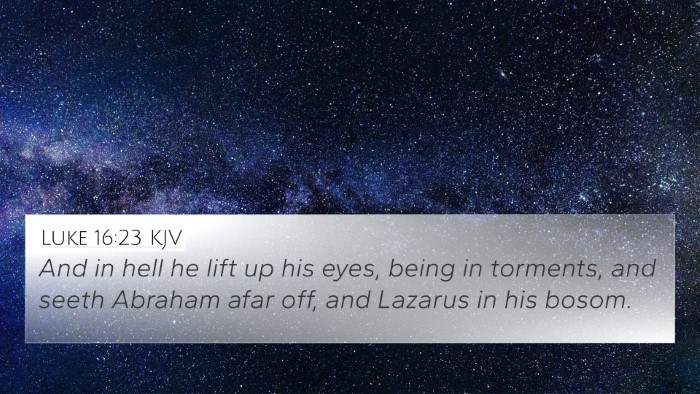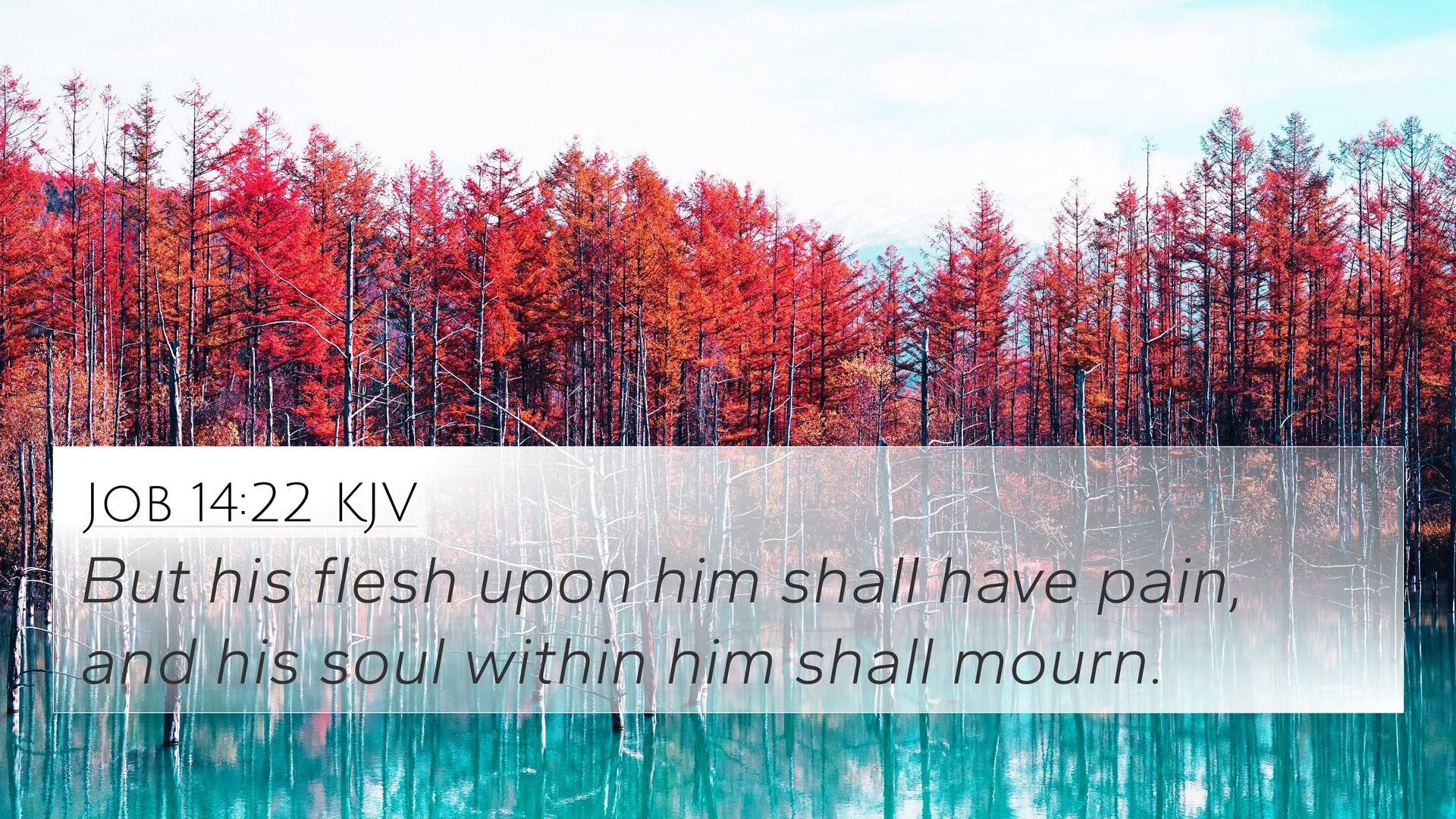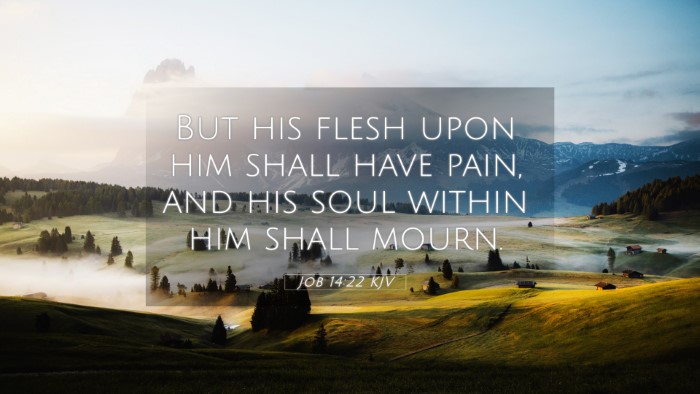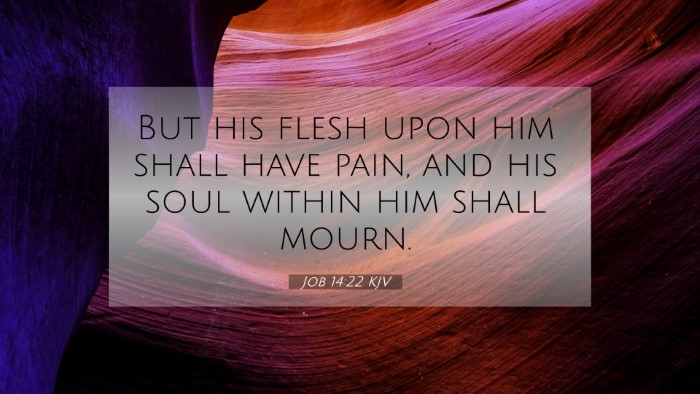Old Testament
Genesis Exodus Leviticus Numbers Deuteronomy Joshua Judges Ruth 1 Samuel 2 Samuel 1 Kings 2 Kings 1 Chronicles 2 Chronicles Ezra Nehemiah Esther Job Psalms Proverbs Ecclesiastes Song of Solomon Isaiah Jeremiah Lamentations Ezekiel Daniel Hosea Joel Amos Obadiah Jonah Micah Nahum Habakkuk Zephaniah Haggai Zechariah MalachiJob 14:22 Similar Verses
Job 14:22 Cross References
But his flesh upon him shall have pain, and his soul within him shall mourn.
Uncover the Rich Themes and Topics of This Bible Verse
Listed below are the Bible themes associated with Job 14:22. We invite you to explore each theme to gain deeper insights into the Scriptures.
Job 14:22 Cross Reference Verses
This section features a detailed cross-reference designed to enrich your understanding of the Scriptures. Below, you will find carefully selected verses that echo the themes and teachings related to Job 14:22 KJV. Click on any image to explore detailed analyses of related Bible verses and uncover deeper theological insights.

Job 33:19 (KJV) »
He is chastened also with pain upon his bed, and the multitude of his bones with strong pain:

Job 19:20 (KJV) »
My bone cleaveth to my skin and to my flesh, and I am escaped with the skin of my teeth.

Job 19:26 (KJV) »
And though after my skin worms destroy this body, yet in my flesh shall I see God:

Proverbs 14:32 (KJV) »
The wicked is driven away in his wickedness: but the righteous hath hope in his death.

Luke 16:23 (KJV) »
And in hell he lift up his eyes, being in torments, and seeth Abraham afar off, and Lazarus in his bosom.
Job 14:22 Verse Analysis and Similar Verses
Understanding Job 14:22
Job 14:22 states:
"But his flesh upon him shall have pain, and his soul within him shall mourn."
This verse comes from a section of Job where he reflects on the nature of human existence and suffering. Below is a combination of insights from various public domain commentaries, providing a deeper understanding of its meaning.
Summary of Interpretations
In this verse, Job expresses a profound observation about human suffering:
- Job's Condition: The verse emphasizes the painful experience of the body in contrast to the internal anguish of the soul.
- Connection to Mortality: It relates to the overarching theme of mortality in the Book of Job, where the fragility of life is a recurrent motif.
- Body and Soul Distinction: Job’s recognition of the pain in the flesh and the sorrow in the soul highlights the dual nature of human suffering, where physical afflictions often lead to spiritual despair.
Insights from Commentators
Here are insights from notable biblical commentators regarding Job 14:22:
- Matthew Henry: He notes that Job, having thought deeply about death and the human condition, reflects on the intense suffering that accompanies life and death. He states that the internal grief of the soul amplifies the external pain, suggesting a relationship between one's physical state and inner turmoil.
- Albert Barnes: Barnes interprets this verse as Job recognizing that pain is not just a physical experience but a holistic one, affecting both body and soul. He highlights that Job’s expression is a common human experience where bodily suffering leads to a qualitative mourning of the spirit.
- Adam Clarke: Clarke delves into the implications of pain and mourning, suggesting that Job is acutely aware of the tragic circumstances that plague humans. He sees the soul’s mourning as an essential part of the human experience that mirrors the struggles faced by mankind throughout history.
Bible Verse Cross-References
Job 14:22 can be cross-referenced with several significant verses that echo similar themes of pain, mortality, and the human condition:
- Psalm 38:17 - "For I am ready to halt, and my sorrow is continually before me." (The relation of physical pain and continual sorrow.)
- Ecclesiastes 1:18 - "For in much wisdom is much grief: and he that increaseth knowledge increaseth sorrow." (The burdens of knowledge and experience.)
- Isaiah 53:3 - "He is despised and rejected of men; a man of sorrows, and acquainted with grief." (The suffering servant concept connecting the physical and emotional pain.)
- 2 Corinthians 5:2 - "For in this we groan, earnestly desiring to be clothed upon with our house which is from heaven." (An expression of longing and suffering in the earthly body.)
- Romans 8:22 - "For we know that the whole creation groaneth and travaileth in pain together until now." (The universal experience of suffering.)
- James 4:9 - "Be afflicted, and mourn, and weep: let your laughter be turned to mourning, and your joy to heaviness." (Mourning as a state of heart.)
- 1 Peter 5:10 - "But the God of all grace, who hath called us unto his eternal glory by Christ Jesus, after that ye have suffered a while, make you perfect, stablish, strengthen, settle you." (The promise of restoration following suffering.)
Thematic Bible Verse Connections
This verse, along with its cross-references, invites us to explore broader biblical themes:
- Human Suffering: The experience of pain as a universal human condition.
- The Nature of Existence: Reflecting on the fragility of life and the mourning that often accompanies it.
- Hope Amid Suffering: While the verse highlights sadness, subsequent verses in the Bible provide hope and restoration.
Conclusion
Job 14:22 expresses a profound understanding of human suffering and the intricate relationship between physical pain and emotional turmoil. The insights from renowned commentators and the connections to other Bible verses illustrate an important message about the human condition that resonates throughout Scripture. Through tools for Bible cross-referencing, believers can delve deeper into the scriptures, recognizing their interconnectedness and the overarching themes of despair and hope.
In study and reflection, we can appreciate how Job's lament speaks to our own experiences, reminding us that pain is a part of life, but it does not have to define our existence. The Bible, through its thematic connections, provides a guide for understanding these realities and encourages us to seek solace in God amidst our struggles.



